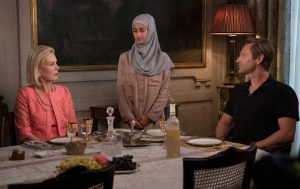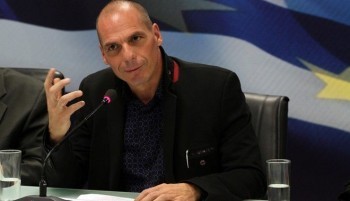“Son of Man /You cannot say, or guess, for you know only/A heap of broken images”
T.S. Eliot, The Wasteland
Matt Weiner’s The Romanoffs offers American television a unique modernist vision of history as a collision of histories, not the more familiar media monolithic account of one linear progression, or even the rarer media version of cyclical history. Weiner’s Romanov chronicles invert standard narrative expectations by beginning in episode 1, “The Violet Hour,” with a happy ending and then moving inexorably into the darker, more sinister consequences of the legacy of the doomed Russian imperial family. But this is only the tip of the historical iceberg. The Romanoffs is not a mere inversion of beginning and end. Indeed, in Weiner’s saga there is arguably no pure beginning and ending. In the eight-episode series about some purported descendants of the Romanov dynasty, time slips and slides laterally and in unpredictable, oblique directions as the ostensibly clear historical fact of the Romanov slaughter as a point of origin for them dissolves into the ineffability of myth. Time does not clarify, it confounds. There is the seemingly trivial, unexplained metamorphosis of the spelling of the name Romanov, which has seen the final “v” replaced over time and transfer to America by the two “f’s” of the title. But there is also the crucial instability of the definition of the Romanov legacy, which becomes more unfathomable as the series unfolds. Does a legacy exist? How does it get transmitted through time? Here history flows in random streams that intersect with many other heritages and legacies, recalling in its daring the magisterial manner in which David Lynch depicted the slippages of time in Twin Peaks 2017. Is that what you heard about Weiner’s series? No, I didn’t either. And we will come to that too in due course. First, let’s take a good, close look at the the work in question.
Weiner places a lot of trust in the audience; there is much work for us to do if we are to savor the intricately interwoven delights of stories about characters who may have invented their histories. If we wait to be told how to feel and think, we will drift off into irrelevant comparisons between this incomparable show and anthology series’ like Black Mirror, which offer a much simpler relationship among one off, similarly uncanny but otherwise unrelated episodes. Weiner’s is not an anthology show; it is a poem in eight sections. To launch our speculations about Weiner’s poetic vision, let us ponder the title of the first Romanoff episode, “The Violet Hour,” which is a phrase from T. S. Eliot’s poem The Wasteland, a long meditation on history. I haven’t spoken directly with Weiner about this allusion, but I wouldn’t be surprised if Eliot’s elusive poem was at least part of the inspiration for the series. In speaking of history, Eliot writes, “What are the roots that clutch, what branches grow/Out of this stony rubbish? Son of man,/You cannot say, or guess, for you know only/A heap of broken images, where the sun beats,/And the dead tree gives no shelter…” Eliot promises to show us, his readers, our place in history in the form of “your shadow at morning striding behind you/Or your shadow at evening rising to meet you.” He intends to introduce us to “fear in a handful of dust.” A complex view of history to say the least, and slightly more dire than Weiner intends, though Weiner clearly wonders in his turn about shadows, fear, and phantom “roots that clutch.”
In The Wasteland the violet hour is twilight, a moment of hope; and it appears in the section called, “The Fire Sermon,” where the phrase invokes a time of return to home from a dreary, depersonalized public world. Home, however, never rises to the desperate hope for refuge. By contrast, in Weiner’s violet hour, it does, if in an ambiguous way. As the episode closes, we see the lineage of the Romanovs (perhaps) unexpectedly bearing a new bloom This, the most optimistic denouement in the entire series, caps an initially less than hopeful tale about Greg (Aaron Eckhart) the charming, young American nephew of Anushka (Marthe Keller) a woman of une age certaine, a Parisienne whose life is predicated on her passionate belief in her relationship to the old Tsarist nobility. Greg has no purpose or direction, and Anushka may be slightly delusional. What historical evidence is there for her Romanov claims? The Fabergé egg she keeps in her curio cabinet is, by her own admission, a copy of the real thing, which, she says was stolen by the Nazis when they took over her magnificent apartment. Anushka longs for a new Romanov generation and Sophie (Louise Bourgoin), Greg’s pretty but grasping French girlfriend ,wants nothing to do with motherhood; she seems to find the most attractive thing about Greg the apartment he will inherit from Anushka, a debased concept of legacy, to be sure. Imperious, arrogant Anushka knows it and fears there will be no next generation.

Anushka (Marthe Keller), Hajar (Ines Melab), and Greg (Aaron Eckhart) from Matthew Weiner’s The Romanoffs. (Source: Christopher Raphael / Amazon)
In an unexpected turn of events, hope surges when Greg impregnates Hajar (Ines Melab), a French Muslim, who is working her way through nursing school as Anushka’s care giver. Surprise! Greg’s sexual encounter with Hajar takes place after Anushka’s initial racist disdain for Hajar turns to respect and even love which fuels her increasing anger at Greg and Sophie. When Anushka decides to bequeath her apartment to her home health aid, ever resourceful, manipulative Sophie coaxes Greg into sweet talking Hajar so that she will refuse Anushka’s generosity. She’s too cagey for own good. Greg’s efforts to win Hajar over go far beyond what anyone expects; but, astonishingly, Anushka is overjoyed by the result. The episode concludes during “the violet hour,” after we have seen Sophie steal the fake Fabergé she believes to be real, heading for the disillusionment we know she deserves. Anushka, for her part, happily observes Greg and Hajar peacefully together in the twilight, anticipating the new birth.
Oh, did I mention that Anushka’s actual given name is Anastasia? The most obvious immediate conclusion to leap to is that Weiner is being sentimental about the myth of the Romanov who got away. But that would be precipitous. And it would be wrong. He is rather challenging our sentimental embrace of the Anastasia myth through a story in which a woman with a dubious Romanov pedigree and a faux Fabergé welcomes a grandchild with a once despised heritage. The mind boggles a bit, not as much as it will, but just enough to begin the Romanov journey not only with a skewed version of the Anastasia story, but also with a similar challenge in the series main title to the sentimentality attached to the entire scenario of the royal massacre.
The main title conveys a highly romanticized image of the lives of the Romanovs, a highly romanticized image of the shooting, and then a strangely fairy tale-like escape into the forest by a young woman, whose face we cannot see. Her brilliant blue cape, which billows out behind her, morphs into a windbreaker of the same color worn by a contemporary American student emerging from the subway. Between the pristine white garments in which the dying Romanov’s are clothed as their blood spatters them – not at all the clothes in the photos we see later of the death room – and the enigmatic, time traveling Anastasia figure, the main title montage plucks the strings of seductive stereotype and all but screams, “fake news.”
Questions about Romanov lineage and also about how we can know anything about history become more and more insistent as the episodes unfold. One way in which these questions are posed is through the presence of a (fictional) biographer of the family named Daniel Reese (John Slattery), who pops up in episodes 2 and 4, “The Royal We,” and “Expectation;” where we learn of Reese’s (fictional) study, titled The Romanovs: The Savage and The Strong, and in the episodes that touch on a six-part television series based on Reece’s book. Catherine Ford (Diane Lane), plainly an English professor with high intellectual standards, who appears briefly in “Expectation” and stands at the center of episode 5, “ Bright and High Circle,” judges Reese’s book harshly, as the worst kind of unsubstantiated guess work. At the very least she casts a shadow over an account that is disseminated in public discourse through books, television, and when he gives lectures as an expert. The series seconds her opinion.
The savage and the strong? Very catchy title, but one that Weiner mocks. Yes, the savage nature of the family may be (but only may be) visible in Michael Romanoff (Corey Stoll) in “The Royal We,” episode 2, when he decides to kill his wife to pursue a sudden infatuation with a woman he meets on jury duty. Or Romanov power to manipulate may be visible in “Expectation,” episode 4, in the deceptions perpetrated by Romanov/ff (?) Julia (Amanda Peet) who, for a couple of decades, has been perpetrating a series of lies. She is hiding from her rich, dependable husband Eric (Jon Tenney) the true paternity of her daughter, Ella (Emily Rudd), who is her daughter with the mercurial Romanov chronicler, Daniel Reese. And now that her daughter is pregnant, the lies are multiplying. Possibly, implacable (savage, strong?) Romanov self-involvement is visible in episode 7, “The End of the Line,” in Anka (Kathryn Hahn) a supposed Romanov who, along with her husband Joe (Jay R. Ferguson) enters into an adoption process in Russia. While Joe only wants to love any baby and attend to its needs, Anka is determined to bring home a baby no less than perfect, no matter who gets hurt along the way. Yet at the same time, Michael, Julia, and Anka, and other “Romanovs” we meet, are as pathetic as they are cruel. So, not only are we treated to the ineffability of the Romanov legacy, and the reductionist version perpetuated through social discourse, we are also tantalized by its indeterminate nature, should it exist, as a mixture of victim and predator.
Weiner’s most complex and riveting depictions of the perplex of history and legacy occur in episodes 3 and 6, “House of Special Purpose,” and “Panorama,” in which he goes beyond blurring the path of transmission to a surreal apprehension of the forces surging through human events. “House of Special Purpose,” takes place in Austria, where the Romanov television series based on Reese’s book is being shot by a possible Romanov, Jacqueline (Isabelle Huppert), a French actress turned director. However, midway through the episode, Jacqueline tells Olivia Rogers (Christina Hendricks), the American movie star who has recently arrived to play Tsarina Alexandra, that she lied about being a Romanov to get the job. Or is that a lie? Neither we nor Olivia know whether to believe her, since we have already seen a very tenuous relationship between Jaqueline and truth. Disorienting. It is up to the audience to weigh how much we can trust anything she says. As this episode unfolds, truth becomes increasingly elusive for Olivia and for us.
Spoiler! The House of Special Purpose was the historical name of the place in which the Romanov family was killed, and Olivia is killed on the television set of that house although she is only playing a Romanov. The episode suggests the way historical mythologies bleed randomly as they are propagated. From the first, there is a growing anxiety for Olivia, arguably akin to that felt by the Romanovs while they were being held captive by Communist forces. Olivia is replacing an actress who abruptly left the production, and she gets conflicting reports about whether her predecessor was fired, left on her own, or died of a drug overdose—in the hotel room Olivia has been assigned. At the same time, Olivia, and we, almost immediately sense a plot managed by Jacqueline that aims to destabilize Olivia. Why? To get a better performance out of her? Or something more sinister and stranger? At first, it’s a question of small strangenesses. The series is being shot out of order; the last, violent episode six, in which the family is murdered is taping first. Olivia is surprised and a little jittery about this, but not as jittery she is after she is called to a meeting with Jacqueline in the bar of her hotel, only to be told there is no bar and that Jacqueline is incommunicado for the night. The plot thickens when later she discovers that there is a bar and that European crew members have been told to pretend they can’t speak English when Olivia talks to them.
Things take a turn for the worse when Olivia wakes in the middle of the night to see an apparition of little girl dressed in an elegant, old fashioned gown wandering silently toward a closet into which she disappears. Olivia finds the small gown in the costume trailer, but it apparently has never been used, and she can’t find the little girl. Then, at a dinner party for the series’ producer, his Russian wife succumbs to hysteria when Jacqueline is suddenly (seemingly) possessed by the spirit of a long dead Romanov and curses her. Events veer toward the harrowing when Olivia has had it with the production, and leaves the sound stage to pack and depart for the United States. Before she can get out of her costume, a crew of brutal men in military garb take her by force back to the set.
Irrational as it may seem, Olivia feels as if she is actually in captivity, and it certainly appears that way to the audience. Things get worse when, dragged into the production replica of the room in which the Romanovs were murdered, Olivia is shot at, along with the other cast members, by her abductors. Panic-stricken, Olivia watches the other actors drop to the floor around her, spattered with blood. After she herself drops to the floor, a cheer goes up from behind the camera, which we now see for the first time. This has been a manipulation of Olivia as part of the taping of the final scene. As the other actors rise, Jacqueline jubilantly tells Olivia she will win an Oscar for her performance, but in the next moment realizes, as do we, that Olivia has died of fright.
Whether Olivia has been the victim of unforgivable cruelty or of her own subconscious fears, the overall sense of the episode is of the potentially deadly repercussions of what we believe to be true, even without evidence. Daniel Reese’s problematic chronicle has become tangled up in toxic cultural manipulations and economics; individual ambitions, jealousy, power plays; and Olivia’s susceptibilities to confusion of reality and fantasy. But Weiner does not put forward this extraordinary episode as the underlying series definition of either history or the Romanov/off legacies. It is but one of the many facets of the ramifications of history, which show themselves peripherally in all the episodes and centrally in the remarkable episode 6, “Panorama,” which is an ecstatic invocation of how history in general and the Romanov history in particular can also inspire and elevate the imagination.
Stay tuned for the ecstasy of history, the entrance of the series’ audience into the depths of the labyrinth, and the nightmare of the marketers in Part Two of “The History Perplex in Matt Weiner’s The Romanoffs.”
– END OF PART ONE –
Martha P. Nochimson‘s ninth book, Television Rewired: The Rise of the Auteur Series will be published on July 15, 2019. Her earlier work includes The Passion of David Lynch: Wild at Heart in Hollywood; David Lynch Swerves: Uncertainty From Lost Highway to Inland Empire; and Dying to Belong: Gangster Movies in Hollywood and Hong Kong. She has taught at the Tisch School of the Arts (NYU), and she developed and chaired a film studies program for Mercy College. Currently, she is teaching at the David Lynch Graduate Program in Cinematic Arts. She has covered the New York Film Festival for 18 years, and has also covered the Istanbul International Film Festival and the Montreal Film Festival. She is a long-time member of the Columbia University Seminar on Cinema and Interdisciplinary Interpretation.






